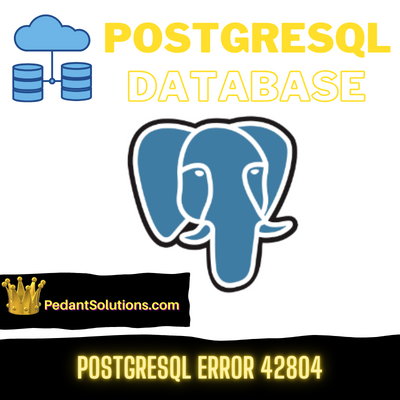PostgreSQL, a robust and feature-rich relational database management system, occasionally throws a curveball in the form of SQL Error 42804. This error code is associated with data type mismatch issues, signaling that the types used in a SQL operation are not compatible. In this article, we will explore the common causes behind PostgreSQL SQL Error 42804 and offer insights into resolving these data type challenges.

Cause of Postgresql sql error 42804
Incorrect Type Casts
A primary cause of SQL Error 42804 is the incorrect usage of type casts in your queries. PostgreSQL is strict about data types, and attempting to cast between incompatible types will result in this error.
Example
SELECT 'abc'::integer;Mismatched Data Types in Comparison
When performing comparisons in your queries, ensure that the data types being compared are compatible. Mismatched data types in conditions or WHERE clauses can lead to SQL Error 42804.
Example
SELECT * FROM products WHERE price > '100';Incompatible Data Types in Arithmetic Operations
Arithmetic operations require compatible data types. Mixing incompatible data types in calculations can trigger SQL Error 42804.
Example
SELECT numeric_column + 'abc' FROM my_table;Mismatched Data Types in Aggregate Functions
When using aggregate functions like SUM or AVG, ensure that the data types of the columns being aggregated are compatible.
Example
SELECT AVG(text_column) FROM my_data;Inserting Values into Incompatible Columns
Attempting to insert values into columns with incompatible data types can result in SQL Error 42804. Verify that the values being inserted align with the expected data types of the target columns.
Example
INSERT INTO users (user_id) VALUES ('john_doe');Mismatched Data Types in Joins
When performing joins between tables, ensure that the columns used for joining have compatible data types. Mismatched data types can lead to unexpected results and SQL Error 42804.
Example
SELECT * FROM orders JOIN customers ON orders.customer_id = customers.customer_name;Incorrect Usage of Data Type-Specific Functions
PostgreSQL provides various functions that are specific to certain data types. Using these functions with incompatible data types can lead to SQL Error 42804.
Example
SELECT DATE_PART('hour', '2023-12-18');Attempting to Concatenate Incompatible Data Types
Concatenating strings or values of different data types can be a source of SQL Error 42804. Ensure that the data types are compatible before performing concatenation.
Example
SELECT 'Hello, ' || 123;List of some common error code except Postgresql SQL error 42804
Here’s a list of some common PostgreSQL error codes, including but not limited to SQL Error 42601:
- SQL Error 42P01 – Undefined Table: This error occurs when a query references a table that does not exist in the database.
- SQL Error 42703 – Undefined Column: Triggered when a query attempts to use a column that is not present in the specified table.
- SQL Error 23505 – Unique Violation: Indicates that an attempt to insert or update a record violates a unique constraint.
- SQL Error 23502 – Not Null Violation: Occurs when an attempt is made to insert a null value into a column that has a NOT NULL constraint.
- SQL Error 42P02 – Undefined Parameter: This error is raised when using a parameter that is not defined in the context of the query.
- SQL Error 22001 – String Data Right Truncation: Signifies that a string or character data is too long for the specified column.
- SQL Error 42701 – Duplicate Column: Triggered when a table is created with duplicate column names.
- SQL Error 25P02 – In Failed SQL Transaction: Indicates a problem with transactions, often caused by trying to execute a query within a failed transaction.
- SQL Error 23000 – Integrity Constraint Violation: This error occurs when a foreign key constraint is violated during an insert or update operation.
- SQL Error 42602 – Invalid Syntax: Similar to SQL Error 42601, this error code is raised when there’s a syntax error in the SQL statement.
- SQL Error 28000 – Invalid Authorization Specification: Signifies authentication issues, such as providing incorrect login credentials.
- SQL Error 57014 – Canceling Statement Due to User Request: Occurs when a user cancels a running query or statement.
- SQL Error 22003 – Numeric Value Out Of Range: Indicates that a numeric value exceeds the valid range for its data type.
- SQL Error 08006 – Connection Failure: Raised when there is a problem establishing or maintaining a database connection.
- SQL Error 42P05 – Duplicate Table: Similar to SQL Error 42701, this error is raised when trying to create a table with a name that already exists.
- SQL Error 42601 – Syntax error: PostgreSQL uses error code 42601 to signify a syntax error within the SQL statement being executed. This error arises when PostgreSQL encounters a statement with a syntax it cannot recognize or correctly parse. Click here to know more.
